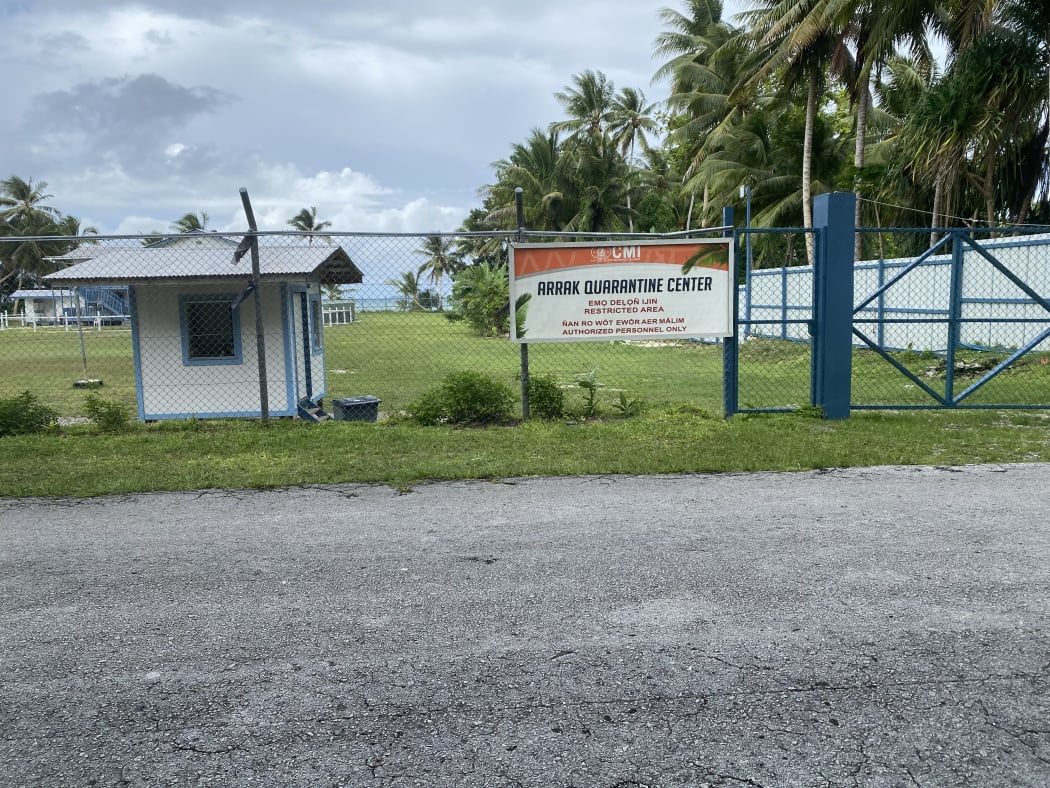The Marshall Islands has dramatically increased the number of citizens being repatriated, while reducing mandatory quarantine requirements.
In addition, with over 70 percent of its urban population now vaccinated with a first dose of the Covid-19 vaccine, the Ministry of Health and Human Services is gearing up to take its vaccine programme to remote outer islands.

A quarantine centre in Majuro Photo: RNZ Pacific / Giff Johnson
Important developments this week on the Marshallese repatriation programme include a shortening of the quarantine time and increased numbers of people returning.
At last Thursday's Cabinet meeting, Marshall Islands leaders endorsed a Ministry of Health and Human Services/National Disaster Committee recommendation to reduce the quarantine time at the Kwajalein Army base from three to two weeks.
Coupled with the quarantine in Honolulu prior to leaving Hawaii, group four - which was released Wednesday this week - and future groups will be subject to four weeks of quarantine, two each in Honolulu and Kwajalein.
The Health Secretary Jack Niedenthal said the Marshall Islands had learned from managing the repatriation programme since last June and felt comfortable to reduce the quarantine period, which is still one of the most stringent screening systems used anywhere in the world.
"Counting both (quarantine facilities at) Arrak and Kwajalein, we've repatriated over 1,000 people," Niedenthal said this week.
"Originally it was 21 days at Kwajalein because the Army only wanted to do a one-week quarantine in Hawaii (for its returning workers)."
But, he added, this had now changed to two weeks in Hawaii, the same as for the Marshall Islands government-sponsored groups that are returning.
Niedenthal said it was not only four weeks of quarantine. Each person being repatriated must undergo five Covid tests during that period.
After some initial hiccups with the first repatriation group last October, the ministry rejiggered the testing schedule that it now anticipates can capture any possible Covid case while people are still in quarantine.
Testing system
In Hawaii, Marshallese being repatriated get one Covid test before they enter quarantine, their second two days in, and a third one within 72 hours of departing for Marshall Islands.
After arriving at Kwajalein, they are again tested on day seven and on day 14, prior to being released.
On top of this, the ministry is communicating with Hawaii health authorities to arrange a system for providing Covid vaccines to Marshallese prior to them leaving Hawaii for Kwajalein.
The Army, which operates a missile testing facility at Kwajalein, started repatriating its base workers last June after agreeing to a series of protocols with Marshall Islands authorities. It also opened its facilities to the government to launch repatriation of Marshallese late last year.
"Safety is always the main concern," said Niedenthal. "We're confident the four weeks and testing system is safe."
Since the first repatriation group of 27 last October, the numbers have steadily grown. The group released this week is 52.
Group five, which went into quarantine in Honolulu this week in preparation for flying to Kwajalein in two weeks, numbers 77. According to the Office of the Chief
Secretary, the next group includes 76 Marshallese and one diplomat.
Army Colonel Jeremy Bartel approved the expanded numbers for group five and has organized quarantine accommodations for this larger number.
While the monthly repatriation groups have increased in size, the Health Ministry is preparing to start Covid vaccinations within the next two weeks on the outer islands.
Niedenthal said Jaluit Atoll, one of two sub-centers in the outer islands, has been tapped as the first atoll in the outreach programme.
Vaccines
Last week, the ministry gained endorsement from the Cabinet for using the one-shot Johnson & Johnson brand vaccine because it requires only one visit to deliver the shots to the outer islands, which must be reached by plane or ship travel.
Niedenthal said, however, the ministry was also looking at islands where it was logistically practical to provide the two-dose Moderna vaccine, which is the vaccine being used to date in the urban centers of Ebeye and Majuro.
Through March 26, the ministry reports that 71 percent of the urban population has received its first Moderna vaccine, while 44 percent are fully vaccinated with both shots.
The ministry already has 800 doses of the recently release Johnson & Johnson vaccine on hand, and has been promised 10,000 more doses from the US Centers for Disease Control in April.
"It is a challenge to get two shots for the outer islands," said Niedenthal. "This is why I recommend the Johnson & Johnson vaccine." Both the Moderna and Pfizer
brand vaccines require two shots spaced 28 days apart.
The ministry is targeting both Jaluit and Wotje to be in the first wave of outer island vaccines.
Although the effectiveness of the Johnson and Johnson vaccine is said to be lower than both Moderna and Pfizer brands, Niedenthal said studies of people using the Johnson & Johnson vaccine show that there were no serious symptoms and no deaths for anyone who received the shot and later became infected with Covid.

